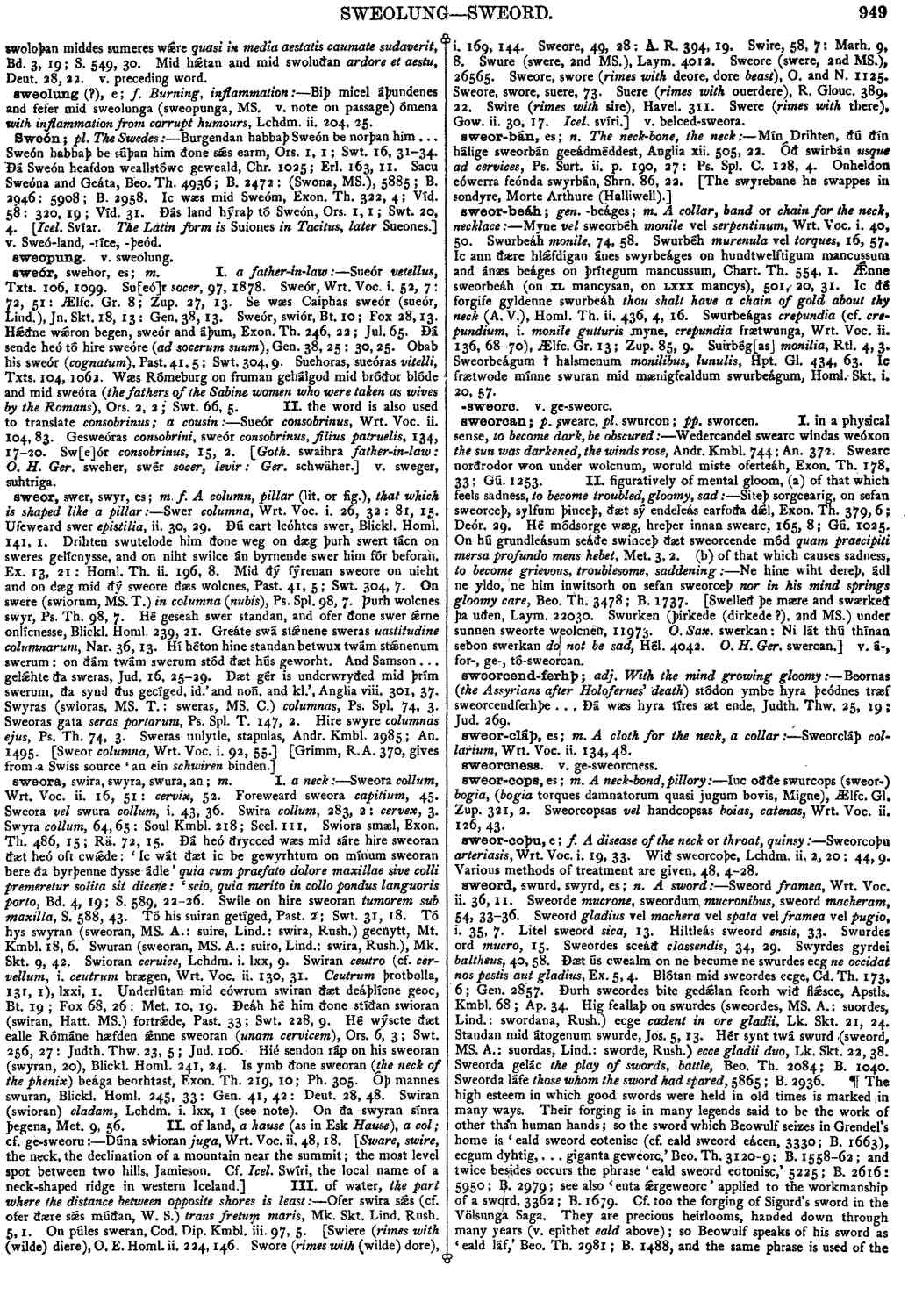sweord
- noun [ neuter ]
-
Sweord
framea,
- Wrt. Voc. ii. 36, 11.
-
Sweorde mucrone, sweordum mucronibus, sweord
macheram,
- 54, 33-36.
-
Sweord gladius vel machera vel spata vel framea vel
pugio,
i.- 35, 7.
-
Litel sweord
sica,
13. -
Hiltleás sweord
ensis,
33. -
Swurdes ord
mucro,
15. -
Sweordes sceáð
classendis,
- 34, 29.
-
Swyrdes gyrdei
baltheus,
- 40, 58.
-
Ðæt ús cwealm on ne becume ne swurdes ecg
ne occidat nos pestis aut gladius,
- Ex. 5, 4.
-
Blótan mid sweordes ecge,
- Cd. Th. 173, 6; Gen. 2857.
-
Ðurh sweordes bite gedǽlan feorh wið flǽsce,
- Apstls. Kmbl. 68; Ap. 34.
-
Hig feallaþ on swurdes (sweordes, MS. A.: suordes, Lind.: swordana, Rush.) ecge
cadent in ore gladii,
- Lk. Skt. 21, 24.
-
Standan mid átogenum swurde,
- Jos. 5, 13.
-
Hér synt twá swurd (sweord, MS. A.: suordas, Lind.: sworde, Rush.)
ecce gladii duo,
- Lk. Skt. 22, 38.
-
Sweorda gelác
the play of swords, battle,
- Beo. Th. 2084; B. 1040.
-
Sweorda láfe
those whom the sword had spared,
- 5865; B. 2936. ¶
-
Cf. too the forging of Sigurd's sword in the Völsunga Saga. They are precious heirlooms, handed down through many years (v. epithet
eald
above); so Beowulf speaks of his sword as 'eald láf,'- Beo. Th. 2981; B. 1488, and the same phrase is used of thesword wielded by one of his followers in the chief's defence, 1595; B. 795.
- In reference to the sword given by Beowulf to the Dane who had guarded his ship, it is said that the recipient 'syððan wæs on meodobence mádme ðý weorðra, yrfeláfe,' 3810; B. 1903; another sword is called 'Hrédles láf,' and of it is said 'næs mid Geátum sincmáðþum sélra on sweordes hád,' 4389-93; B. 2191-3; and later on mention is made of 'gomel swyrd, Eánmundes láf,' 5216; B. 2611; Hrunting, the sword which is lent to Beowulf, is 'án ealdgestreóna,' 2921; B. 1458.
-
So, too, Byrhtnoth tells the Danes who demand tribute of him, that the tribute will take the form of 'ealde swurd,' used with unpleasant effect upon the invaders. The same point may be illustrated from other than poetical sources. Thus in Alfred's will it is said that he leaves 'Æþeréde ealdormenn án sweord on hundteóntigum mancusum,' Chart. Th. 489,
- 32; in
-
Indeed the sword is often mentioned in wills. The importance of the sword is further marked by its receiving a name. The sword with which Beowulf is armed for his attack on Grendel's mother is named Hrunting, and to the praise of this weapon the poet devotes several lines,
- Beo. Th. 2914-33; B. 1455-64; at a
-
See, too,
- Wald. 4; Vald. 1, 3.
-
And elsewhere the same point may be noted, e. g. in the Nibelungenlied. 'daz Nibelunges swert. . . Palmunc was genant;' and this weapon plays a part in the drama to the last scene. In Scandinavian story there is Hákon's sword 'kvernbítr,' which king Athelstan gave him, and Egill has his sword that he called 'Naðr.' See, too, the story of the Cid and the two swords, Colada and Tizona, which he gave to his sons-in-law, the Infantes of Carrion, and which he claimed from them after their unworthy treatment of their wives, Chronica del Cid, c. cclii. Of the value of the sword and of the decoration bestowed upon it, of the shape or colouring, of the make, many epithets and phrases speak. In the Gnomic verses it is said, 'Gold geríseþ on guman sweorde,' Exon. Th. 341,
- 15; Gn. Ex. 126; and 'máðm in healle, goldhilted sweord' is mentioned, 437, 27; Rä. 56, 14.
-
See, too, the passages quoted under
seolfor-hilt, -hilted.
In the dragon's hoard are 'dýre swyrd,'- Beo. Th. 6089; B. 3048:
- Beowulf lays aside his 'hyrsted sweord, írena cyst,' Beo. Th. 1349; B. 672: he gives a sword 'bunden golde,' 3805; B. 1901: his own sword is 'fáh and fǽted,' 5395; B. 2700.
-
Byrhtnoth's sword is 'fealohilte,' Byrht. Th. 136,
- 45; By. 166; and 'gerénod,' 35; By. 161.
-
Beowulf's Nægling is 'grǽgmǽl,' Beo. Th. 5357; B. 2681: the swords of the Hebrews are 'scírmǽled,' Judth. Thw. 24,
- 38; Jud. 230: other swords are 'hring-mǽled,' Cd. Th. 120, 10; Gen. 1992: Abraham girds himself 'grǽgan sweorde,' 173, 22; Gen. 2865: the Hebrews fight 'fágum sweordum,' Judth. Thw. 24, 18; Jud. 194: 25, 17; Jud. 264.
-
The sword is 'brád,' 26,
- 9; Jud. 318: Byrht. Th. 132, 12; By. 15: brád and brúnecg, 136, 38; By. 163: it is 'gód,' 138, 58; By. 237; 'heard,' Beo. Th. 5966; B. 2987: 5269; B. 2638: Exon. Th. 325, 32; Víd. 120: 'heardecg,' Beo. Th. 2581; B. 1288: 'ecgum dyhtig,' 2578; B. 1287: Cd. Th. 120, 11; Gen. 1993: 'ecgum gecost,' Judth. Thw. 34, 39; Jud. 231: stýled, Exon. Th. 42, 28; Cri. 679.
- For some account of old swords, see Wright's The Celt, The Roman, and the Saxon, pp. 404-6, and Worsaae's Antiquities: see also Grmm. Gesch. D. S. p. 12.
Bosworth, Joseph. “sweord.” In An Anglo-Saxon Dictionary Online, edited by Thomas Northcote Toller, Christ Sean, and Ondřej Tichy. Prague: Faculty of Arts, Charles University, 2014. https://bosworthtoller.com/29688.
Checked: 0